Family Connections
A resource booklet for First Nations and Metis parents in Manitoba
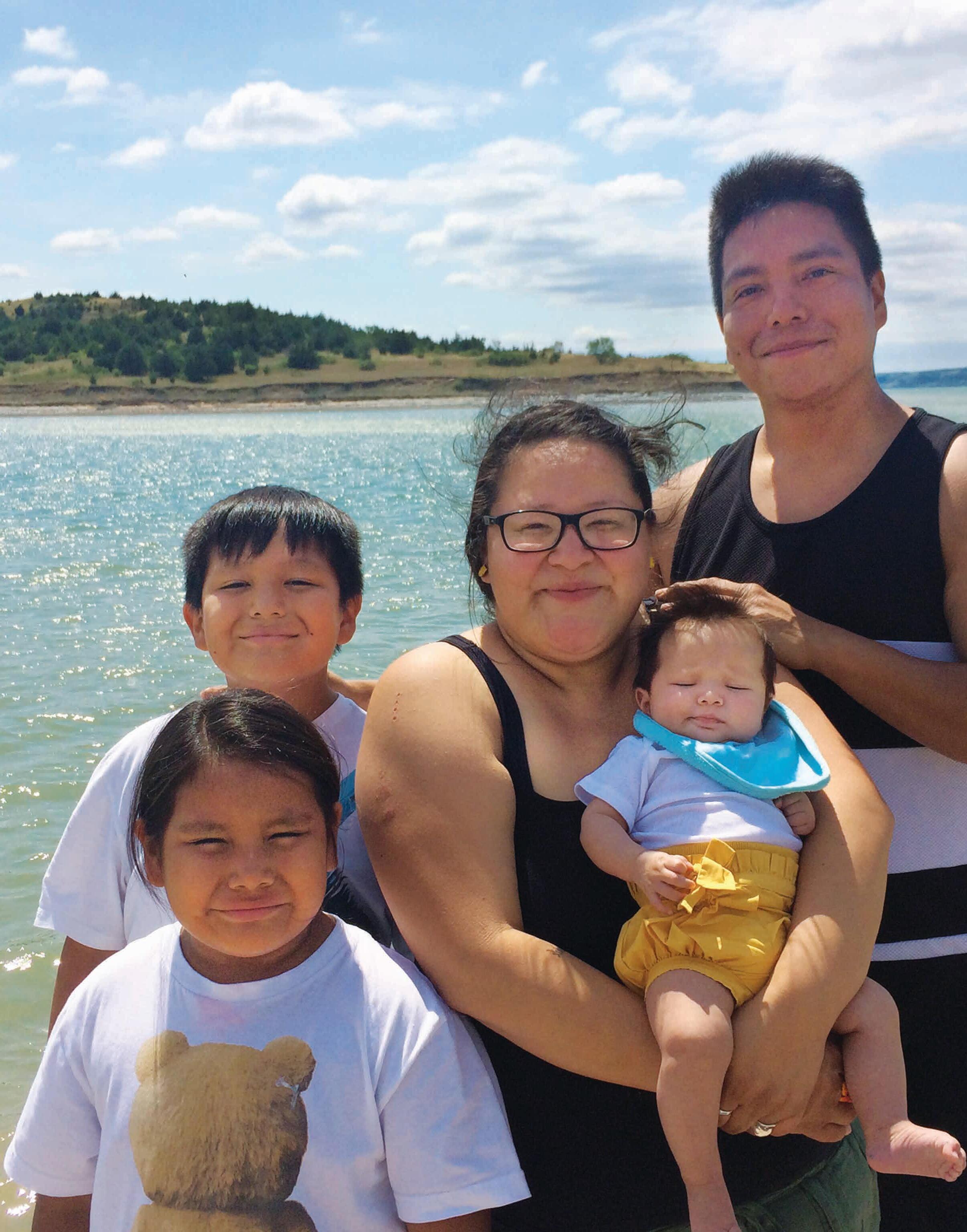
In this issue:
Bonding with your children Forming secure attachments
Connections with family and community
Becoming the parent your children need

A resource booklet for First Nations and Metis parents in Manitoba

In this issue:
Bonding with your children Forming secure attachments
Connections with family and community
Becoming the parent your children need
This resource is one of a series of four parenting resources for First Nations and Metis parents and caregivers in Manitoba. It was developed in response to expressed interest from Manitoba families and community partners for useful, culturally appropriate parenting information. The resources were first developed by the National Collaborating Centre for Indigenous Health (NCCIH) and the BC First Nations Health Authority (FNHA), in partnership with Best Start Resource Centre at Health Nexus and Indigenous parents, family members, Elders and community partners in British Columbia.
The booklets in this series include:
• Growing up Healthy
• Parents as First Teachers
• Fatherhood is Forever
• Family Connections
Several people contributed to the Manitoba adaptation of the BC parenting booklets by sharing their stories, teachings, ideas, Indigenous languages translations and photos. We would like to thank the following people for helping with this adaptation project:
• Joanne Brown, Attachment Network of Manitoba
• Healthy Baby Program Team, Healthy Child Manitoba Office
• FASD team, Healthy Child Manitoba Office
• Manitoba Health, Seniors and Active Living
• Sheila Murdock, Manitoba First Nation Education Resource Centre
• Rachelle Neault and Sharon Wilson, Métis Community Liaison Department, Manitoba Métis Federation
• Jaime Cidro, University of Winnipeg
• Jason Parenteau, Spotlight Probation
• Early Learning and Child Care, Families
• Rick Boucher, Dufferin School
• Tamara Beardy, Children’s Hospital Research Institute of Manitoba
• Karen Davis, Early Years Facilitator
• Lianna Wanbdiska, First People’s Child Care Association
• Rita Cullen, Metis Child & Family Service Authority
• Delores Wallbridge, Peguis Family Centre Head Start Program
• Annie Ballantyne, Grand Rapids School
• Donna Young, OCN Child & Family Services
• Gilbert Fredette, Norway House Cree Nation
• Jean Johnson and Lynda Wright, NCN Family & Community Wellness Centre
• Jenilee Lengyel, Ruth Betts Community School
• Marian Paul, Nor Man Regional Parent Child Coalition
• Vivian Scott, Cross Lake Early Childhood Education Centre
• Best Start Resource Centre at Health Nexus
Wendy McAllister, Manager
Alison Benedict, Health Promotion Consultant
• National Collaborating Centre for Indigenous Health
Margo Greenwood, Academic Lead
Donna Atkinson, Manager
Roberta Stout, Research Associate
Regine Halseth, Research Associate
Lesa Cauchie, Communications Officer
• Healthy Child Manitoba Parenting Initiatives
Indigenous Initiatives and Parent Child Coalitions
© 2017, 2025 National Collaborating Centre for Indigenous Health (NCCIH) * and the Manitoba Government. Production of this series of publications was made possible, in part, with funding from the Public Health Agency of Canada (PHAC) and the Manitoba Government. The views expressed herein do not necessarily represent the views of our funding partners. This booklet was adapted from the BC booklet, Family Connections, published in 2013 in partnership with the BC First Nations Health Authority (FNHA). You can view the 2019 BC booklet online at: nccih.ca/495/Family-Connections-BC.nccih?id=91
* On May 30, 2019, the National Collaborating Centre for Aboriginal Health (NCCAH) officially became the National Collaborating Centre for Indigenous health (NCCIH).
ISBN (print): 978-1-77368-576-2 ISBN (online): 978-1-77368-577-9

This booklet is intended to help you learn about attachment and bonding, what these terms mean, why they are important, and what you can do to form strong connections with your children. It includes information about the importance of strong connections with extended family and community, and how you can be the parent that your children need.
You are home to your children, the anchor that keeps them safe and secure.
Learning effective parenting skills will help you and your children. Attachment and bonding develop in the early years (prenatal to six years) of life and have an impact throughout the lifespan. This booklet shares stories, culture and knowledge to help you learn how you can strengthen your connections with your children. Throughout this booklet, you will find highlighted textboxes with links to additional resources that you can check out, for more information about the subject matter. At the end of this booklet, there also is a list of organizations that offer a wide range of culturally appropriate programs, resources and services to help you achieve the best possible outcomes for your children.
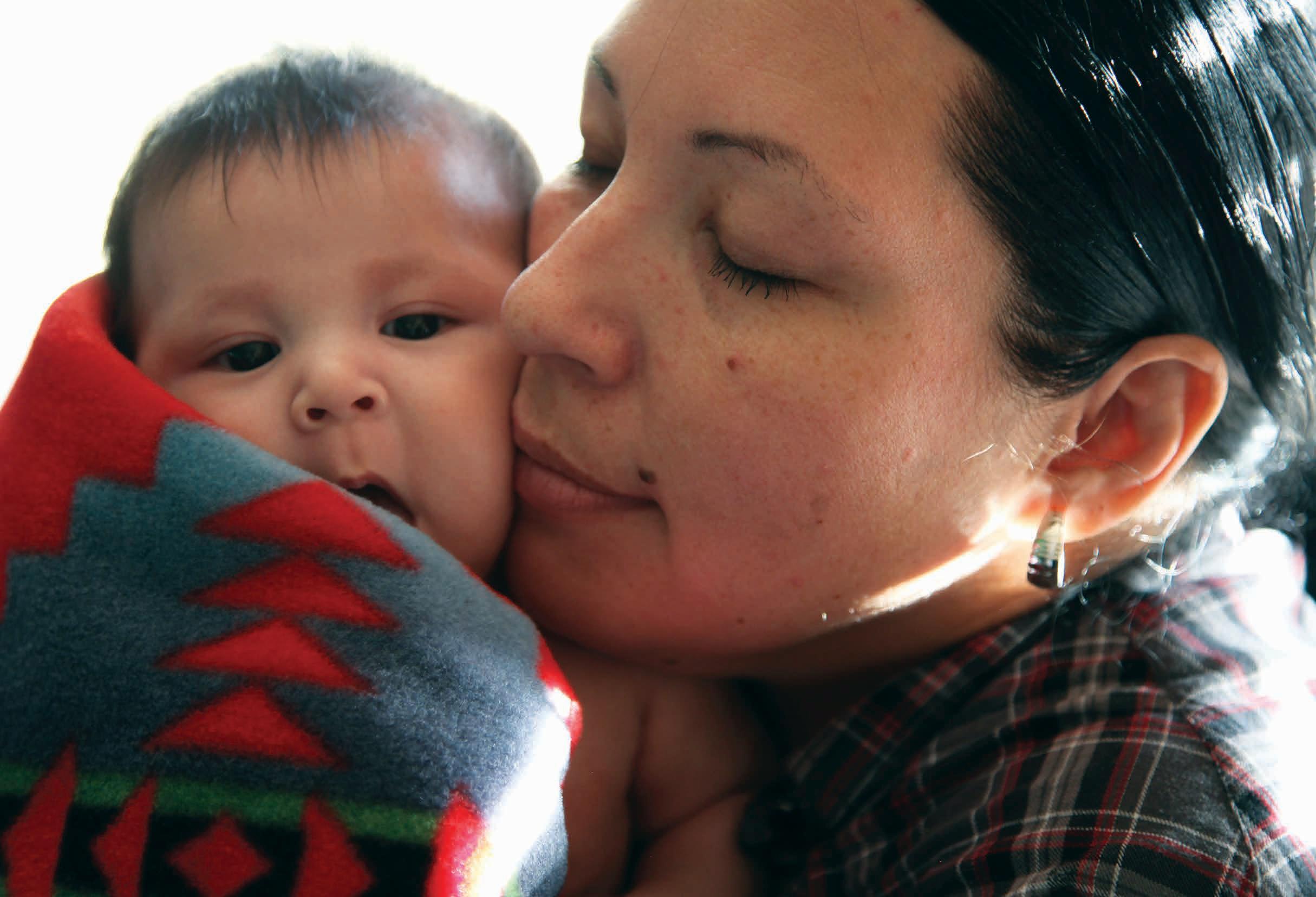
Traditionally, parenting was taught throughout life and parents formed strong attachments with their children. First Nations and Metis peoples learned to parent by watching the actions of their parents, grandparents and extended relations. Parenting was learned first as babies, then as children, later as parents, and then as grandparents.
Bonding is the feelings and connection to your children that you form in the first few weeks after they are born. Over time, parents can do things to strengthen their bond with their children, such as caring for their children and playing with them. Here are some other things you can do to strengthen your bond with your children.
• Watch your children. Turn off the television and computer, and put away your cell phone.
• Learn when your children are trying to tell you something. How do your children act when they are tired, hungry or need to be held?
• Respond to your children’s needs in a caring way. Offer a hug.
• Play, sing and dance with your children.
• Talk about feelings with your children (yours and theirs). For example, ask, “Are you sad? Do you want a hug?”
• Get down to their eye level. Look at them and respond to them when they are trying to tell you something.
• Be consistent with routines and expectations.
• Be patient and repeat things, as often as necessary.
• Learn what to expect from your children at different ages and stages of their life.
• Use a positive approach to parenting. Teach your children by guiding them to healthy behaviours instead of punishing them for negative behaviour.
• Keep your children safe by making sure that your home is safe. Stay close by to them when they are outside. Allow only safe people to be in your children’s lives.
Give Your Child a Safe Start professionals.wrha.mb.ca/old/extranet/publichealth/ files/GYCSS.pdf
Is Your Child Safe? canada.ca/content/dam/hc-sc/migration/hc-sc/cpsspc/alt_formats/pdf/pubs/cons/child-enfant/childSafe-enfant-securite-eng.pdf
• Respond in a positive way to your children by using kind, caring and loving words.
• Use a calm, gentle and caring voice when you talk to your children. Get close to them so you do not have to raise your voice.
• Use actions that show how much you love and cherish your children. Laugh and talk with them. Tell them stories.
• Touch and hold your children. Sing to them.
• Be there to comfort your children when they feel tired and grumpy, upset or hurt.
• Focus on your children by giving them your full attention.
• Tell your children that they are loved, every day.
El gha nu ta means “love” in Dené
• Take turns with your children when choosing what to play with them.
• Respond to your children and teach them to respond to you.
• Get to know your children’s different moods and attitudes, and about the things that affect their behaviour. Be respectful of their individual personalities, wants and needs.
• Limit screen time and the time you spend on your cell phone when you are with your children.
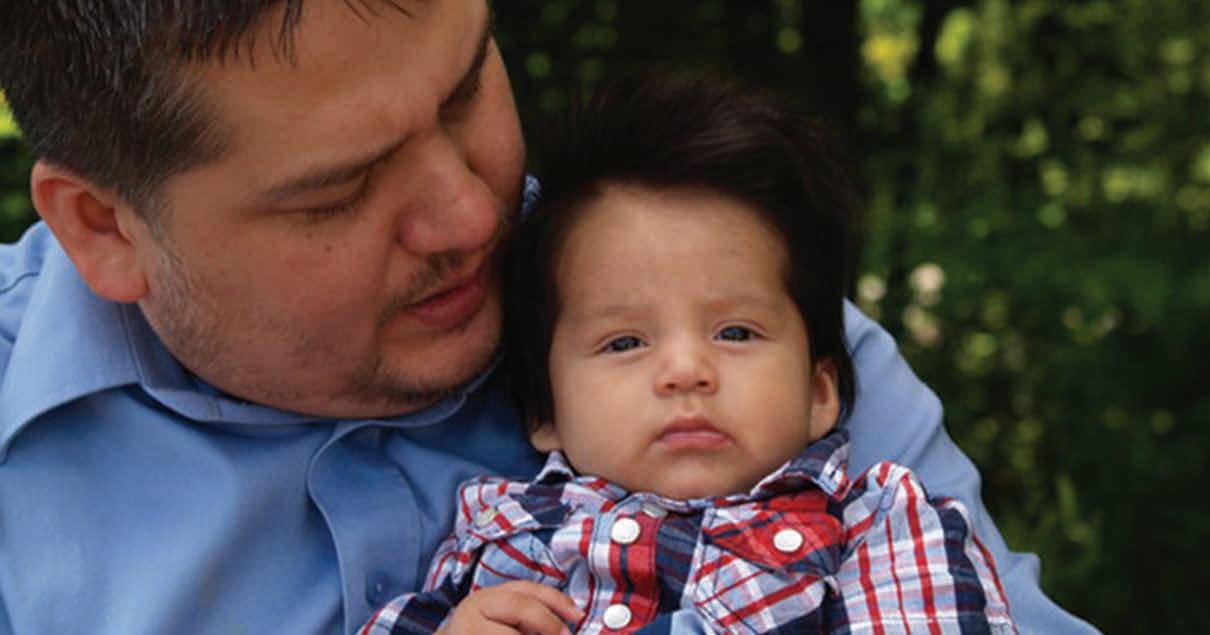
Traditionally, parents saw themselves as being responsible for the spirit of the child. Children are sacred gifts and were loved unconditionally. They had their needs met immediately and were always comforted when they cried. Everyone in the community was responsible for teaching and watching over the children in the community, in a healthy and respectful way. As a result, children developed strong connections to their family and community. They knew who they were and where they belonged in society.
Attachment is the emotional connection your children have toward you. While bonding describes the parent child relationship from the parents’ point of view, attachment describes the relationship from the children’s perspective. Parents develop bonds with their children, and children develop attachments to their parents and caregivers.
A secure attachment forms when parents respond quickly and appropriately to their children, when their children are upset or need attention. Helping your children develop secure attachments is one of the most important things you can do as a parent. Attachments form the foundation for all relationships in your children’s lives. It defines how children see themselves in the world. Secure attachments help children learn to manage their emotions and behaviour (self regulation), and to bounce back from difficult situations (resilience).
Building Resilience in Young Children: Booklet for Parents of Children from Birth to Six Years resources.beststart.org/wp-content/uploads/2018/ 11/K35-E.pdf

When children have secure attachments to caring adults, there are tremendous benefits to them and their family. Secure attachments help children learn to:
• Feel loved and connected
• Deal with emotional pressures and stressful situations
• Try and learn new things
• Be creative and solve problems
• Develop patience and self control
• Show affection
• Develop caring relationships and trust in others
• Be responsible and independent
• Feel confident and good about themselves
• Ask for help when needed
Helping your children to form secure attachments will help to shape their future, physically, emotionally, socially, spiritually, and with learning. It is something that all parents can learn to do. It is as simple as responding to your children quickly, and in a loving and caring way:
• Pick up your children and hold them closely when they cry. Cuddle them often.
• Be interested in what has your children’s interest. Talk to them about what they see.
• Comfort your children when they are hurt, sad or frightened.
• Tell your children, every day, that you love them. Show them that you love and care for them.
• Protect your children when they are in danger or at risk for harm.
• Play with your children, both indoors and outdoors, every day.
• Encourage your children to be patient. Tell them to keep trying when they are frustrated.
• Expose your children to a variety of positive, early life experiences. Manitoba First Nations Guide to Support Early Learning mfnerc.org/wp-content/uploads/2022/10/ SupportEarlyLearning_small.pdf

When I found out I was pregnant I was living in Regina, Saskatchewan. My first instinct was to return home to my community in Northern Manitoba to have a home birth. I was very fortunate to have two Aboriginal midwives available to assist with the delivery of my daughter. I remained at home for two weeks after my daughter was born. During this time, aunties, uncles, cousins and neighbours brought food and gifts. I received a great deal of support from everyone around me.
When I returned to Regina, I experienced a number of emotions. I remember watching my daughter sleeping feeling such joy and amazement by her delicate size. I was also very afraid that I would not be able to take care of her on my own. It was a very overwhelming time. Eventually, days and nights became a blur. My world revolved around breastfeeding, changing diapers and rocking my daughter to sleep. Some days I found it hard to feed myself or to have a shower. I often felt like I did not know what I was doing. After I settled into a routine, I began to bond with my daughter and the fear that I was not going to be able to look after her slowly disappeared.
Motherhood is a life changing experience. It is more challenging than I ever expected. I also did not know that I was capable of loving another human being as much as I have grown to love my daughter.
- Lorena Sekwan Fontaine –Cree Anishinaabe, Sagkeeng First Nation
Connecting your children with extended family and community will help them to have a sense of identity and belonging. When children know who they are and feel like they belong, they see value in life, and in coping with painful emotions. Building a strong sense of belonging in your children requires your time, consistency and effort.
• Show your children pictures and tell them stories about their family members.
• Attend or have family meals or events that include your children’s grandparents, aunts, uncles, cousins, adult siblings or other relatives or close friends of your family.
• Set a regular time when you and your children can call, Skype, or Face Time with relatives that do not live near you. If you do not have phone or internet services, use this time to mail a drawing to them, from your children.
• Attend hockey games or other sports tournaments with your children, and participate with them in community events, such as craft night, feasts, community camps and cook outs, cultural days, celebrations and pow wows.
• Tell your children about your traditional lands and traditional ways of life.
• Learn about the history of your community with your children from Elders, community leaders and educators.
• Practice traditions with your children, such as drumming and fiddling, jigging and singing, making bannock, and picking berries.
• Teach your children words from your First Nations or Metis language, or learn the language together.
• Connect with your local parent child coalition, friendship centre, community health centre or nursing station, family centres in schools, and family support agencies for early childhood programming and parenting support activities that you can participate in with your children.
Imagine a rubber band as the bond between you and your children. When your children are first born, the rubber band is new and strong. As babies, your children stay close to you, relying entirely on you for their every need. As your children grow, the rubber band naturally gets bigger. The distance between you and your children grows too. As your children begin to crawl, the distance may grow to 1 or 2 metres before they need to feel close to you again. Your children will explore a bit further and further as they learn to walk and then run. The distance grows with each new phase in your children’s development.
When you respond to your children’s needs in a loving, caring and attentive way, they learn that you provide comfort, safety and security. Your connection with your children will remain strong.
If your children develop a secure attachment to you, they will know that they can turn to you for encouragement and support, at any age. The rubber band may be small or large, but your children will know that you will be there for them, when they need your help. Parents, other family members and community all have important connections with children. The connections your children make in early childhood will stay with them throughout their lives.
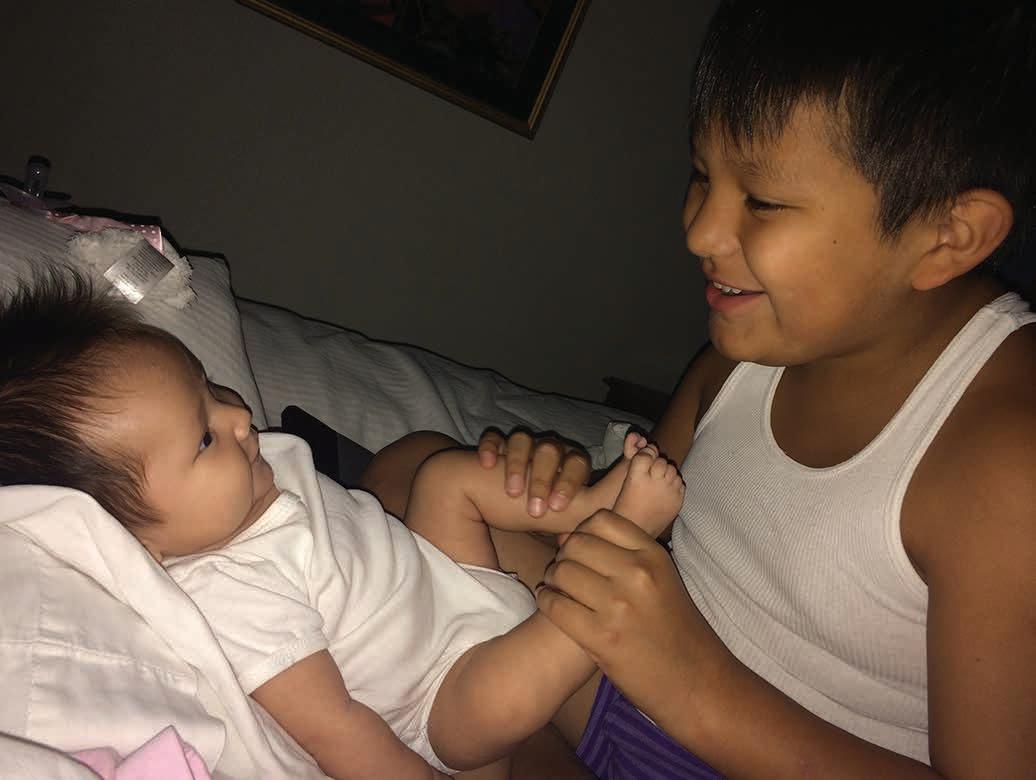
For many parents, bonding with their children is as natural as breathing. For others, it may be difficult to form strong bonds with their children. This bonding will develop, by spending quality time with your children and being close to one another.
In the past, colonial laws interrupted First Nations and Metis parents and grandparents from freely passing on their beliefs, languages and cultural practices to their children. Parents and children were separated through residential schools, medical institutions and foster homes. Children often were taken away from their parents and placed in the care of people who did not understand, love or cherish them. Generations of children were taught that they had no value. Some of these children grew up to believe that they were worthless. Many of them passed these negative teachings onto their own children and grandchildren. Some turned to alcohol and drugs to numb the pain of their painful life experiences.
Bonding can be more challenging for families affected by addictions, trauma, or other intergenerational effects of residential schools and foster homes. Bonding also can be difficult for families caring for children with additional support needs. Through culturally appropriate family support services, the cycle of intergenerational trauma can end. Family circles can be repaired, and families can become healthy and strong again.
The Indian Residential Schools Resolution Health Support Program
Toll Free: 1-866-925-4419 sac-isc.gc.ca/eng/1581971225188/1581971250953
How did you feel when you found out you were going to have a baby? Happy? Worried? Trapped? Afraid? What about when you saw your baby for the first time? Joyful? Anxious? Numb? Terrified? These feelings tell you a lot about how you were raised and how you feel about yourself and your current life situation.
As a parent, you are the first, most important and most lasting teacher in your children’s lives. Your children will turn to you, first, to meet their needs. This can feel like a big responsibility, but the rewards are enormous. In order to love and nurture your children, you need to love and nurture yourself.
• Connect with people who can love, value and support you. These are the people who can help to build your capacity and confidence as an effective parent.
• Avoid being around people who hurt you and disregard the importance of your feelings.
• Turn to different people to support your own mental, emotional and spiritual needs, such as a partner, friend, parent or counsellor.
Like all parents, you will have some hard days, especially when you are tired or worried. Under stressful circumstances, you may find it hard to remain calm, patient and loving toward your children, and you may express feelings of anger and frustration. On these days, it is often difficult to be the positive parent that you want to be for your children. When this happens, take a break and refresh yourself. Get the help you need to become the best parent that you can be for your children. There may be parenting support programs in your community or counseling resources that can help with parenting, healing and self care.
Take good care of yourself so your children get the best of you, instead of what is left of you.
Indigenous Hope for Wellness Helpline
Toll Free: 1-855-242-3310 hopeforwellness.ca
Depression is hard on parents and can make it more difficult for them to respond to their children’s needs on an ongoing basis. About 4 out of 5 birthing parents will experience sadness and mood swings after the birth of their baby. This is called the “baby blues.” Having the baby blues can make you feel sad, tired, overwhelmed and irritable which, in turn, may make fathers and other family members feel worried or upset. Baby blues are caused by changes to the body, eating habits, sleeping patterns, emotions and social situations that happen after the birth of a baby. Baby blues may last for a few days or for several weeks after a baby is born.
Postpartum Depression parentinginmanitoba.ca/postpartum-depression
Celebrating the Circle of Life: Coming back to Balance and Harmony perinatalservicesbc.ca/Documents/Resources/ Aboriginal/CircleOfLife/CircleOfLife.pdf
If you feel unable to show your baby a range of emotions and stay engaged with your baby, then bring friends or family around who can help you until you feel better and are more able to resume this parenting responsibility. If the baby blues last for more than 2 weeks, you may have a postpartum mood disorder (this used to be called postpartum depression).

Postpartum mood disorders are more serious mental health difficulties, such as postpartum depression, postpartum anxiety and obsessive compulsive disorder. Postpartum mood disorders affect 1 out of 5 birthing parents and can last for a year after the birth of a baby, stillbirth or miscarriage. Symptoms of postpartum mood disorders include:
• Not feeling like yourself, like something is wrong.
• Feeling sad and crying a lot.
• Feeling tired and like you have no energy, but can’t sleep.
• Feeling irritable and overwhelmed, and unable to focus.
• Not feeling joy or pleasure.
• Withdrawing from family and friends.
• Feeling hopeless, angry or frustrated.
• Having no appetite or eating much more than usual.
• Having difficulty bonding with your new baby.
• Feeling afraid or anxious about being alone with your new baby.
• Having thoughts about harming yourself, your new baby or your other children.
Postpartum mood disorders affect parents, children and families. If you have thoughts of harming yourself or your baby or if you think you have a postpartum mood disorder:
• Know that this is not your fault.
• Do not feel ashamed or embarrassed to ask for help.
• Find someone you can trust to help you take care of your baby and other children, while you get the help you need.
• Ask your doctor, community health nurse, midwife or family support worker for help right away, if you have thoughts of harming yourself or your children.
Phone: 204-571-4182 Toll Free: 1-866-367-3276 supportline.ca Manitoba Suicide Prevention &
1-877-435-7170 reasontolive.ca
As a parent, you play the most important role in the healthy development of your children and their ability to reach their full potential. Even before they are born, you are their connection to the world. Your unborn baby responds to touch, sounds, light and taste. Let your baby know you care, even before they arrive. During pregnancy:
• Interact with your baby several times throughout the day, every day, to help with your baby’s healthy brain development. With every interaction, you help to give your unborn baby the best possible start in life.
• Create a loving and welcoming space for your baby.
• Use caring and loving thoughts when you think and talk about your baby.
• Touch or rub your tummy. Get to know your unborn baby. If you have other children, help them to get to know their new sibling. Talk about the baby growing in your tummy and what your new baby might look like.
• Sing, read and talk to your unborn baby, so your baby becomes familiar with the sounds of your voices (parents and siblings). Tell traditional stories and laugh.
• Play music that inspires or celebrates your unborn baby.
• Speak your First Nations or Metis language if you know it, and if you don’t, ask someone to talk to your baby in your traditional language.
• Research your family tree and connect with your history so your baby will know their roots. Make connections to their grandparents.
Making Connections: You and Your Growing Baby gov.mb.ca/fs/healthybaby/pubs/hb_ makingconnectionsa.pdf
Making Connections: Your First Two Years with Baby gov.mb.ca/fs/healthybaby/pubs/hb_ makingconnections.pdf
• When you have a midwife deliver your baby instead of having a hospital birth, you can have as many as 8 people with you during your childbirth.
• Midwives don’t just leave you after your baby is born. They continue to offer support to you and your baby, for up to a year.
• You have the right to keep your placenta. Ask for it for ceremonial purposes.
Connecting starts before birth. Let your baby know you care, even before they arrive!

The birth of a new baby is a special time for parents and their family. For first time parents, it also can be a nervous, or even scary, time. It is important for you to remember that even if you did not have the parenting that you wanted or needed, you can become the parent your children need. Welcome and celebrate the arrival of your new baby.
Resources for Parents
gov.mb.ca/fs/healthybaby/resources-parents.html
Your baby relies on you for every need. Show your love and affection for your baby. Give your baby the appropriate attention he/she needs. This will give your baby the confidence to explore and learn.
• Pick up your baby when he/she reaches his/her arms out to you.
• Copy the happy noises your baby makes.
• Share smiles and show your baby that you care.
• Let your baby know you will be there when needed.
• Involve your other children, if any, in helping out with caring for your new baby.
There is no such thing as a bad baby or a spoiled baby.

One of the hardest and most trying times for new parents is when their baby won’t stop crying. Some babies cry more than others. Babies cry to let you know that they need you. This is their way of communicating with you. Babies cry when they are hungry, sick, hurt, scared, overtired, teething, need to be burped or need a diaper change. They do not cry to annoy you. They just need a lot of love, affection and attention.
Always comfort your baby when they cry. You cannot spoil your baby by picking them up too often. Get to know what your baby is trying to tell you. Listen to your baby’s different kinds of crying sounds and comfort your baby in a good way:
• Check to see if your baby needs to be burped or needs a clean diaper.
• Check to see if your baby is too warm, or not warm enough.
• Maybe your baby is hungry. Try breastfeeding.
• Hold your baby close. Make a soft and gentle sound, such as “shhh, shhh, shhh” over and over. Sounds like this may remind your baby of being in the womb where there is a similar soft and constant sound.
• Use skin to skin contact (both parents) to comfort your baby and strengthen their immune system.
Babies who are comforted quickly cry less than babies who are not.
Babies who have additional support needs or who were exposed to drugs or alcohol during pregnancy may cry more than other babies. They may need to be comforted in different ways. Ask your doctor, midwife, community health nurse or family support worker for suggestions in coping with and comforting your crying baby.
• Put your baby in a safe place, such as in his/her crib. Shut the door, and walk away for a moment, until you are calm. Take a short shower or listen to music.
• Call a family member or friend and talk about how you feel. They may be able to come over to give you a break.
• Never shake your baby. This can cause serious or fatal brain trauma to your baby.
• Never hit, push or pull your baby. Pulling or yanking your baby can result in physical injuries to your baby, such as a dislocated shoulder or broken arm.
• If you feel you cannot control your emotions and feel like you might hurt your baby, get the help you need.
Helplines in Manitoba for parenting findahelpline.com/countries/ca/mb/topics/ parenting
The crying time will pass. There are a wide variety of online videos, parenting tips and other resources to help parents cope with crying babies. If you do not have phone or internet services, you can get copies of these resources from your community health centre, nursing station, friendship centre, parent child coalition, family centres in schools or family support worker.
Why is my baby crying? What can I do? parentinginmanitoba.ca/why-is-my-baby-cryingwhat-can-i-do
Healthy Baby Community Support Programs gov.mb.ca/fs/healthybaby/communitysupports.html
Your baby was in the womb for 9 months. It was a warm and tight space. It is comforting and familiar for your baby to feel your warmth and your heartbeat. Babies want to be close to their parents and caregivers. Develop a warm, caring and trusted relationship with your baby.
• Hold your baby. Talk to your baby. Look at your baby.
• Use a wrap, cradleboard (tikanagans) or mossbag to help keep your baby close and feeling secure.
• Keep your baby nearby at night. Your baby should sleep in your room, in a safe crib, baby box, swing or bassinet that is defined by the Canada Consumer Product Safety Act (CCPSA). Make sure there are no bumper pads, pillows, toys or heavy blankets in the baby’s sleep area.
• To keep your baby safe, put him/her to sleep on his/ her back.
Safe Sleep and Your Baby parentinginmanitoba.ca/safe-sleep-and-your-baby
Is Your Child Safe? Sleep Time canada.ca/content/dam/hc-sc/migration/hc-sc/cpsspc/alt_formats/pdf/pubs/cons/child-enfant/sleepcoucher-eng.pdf
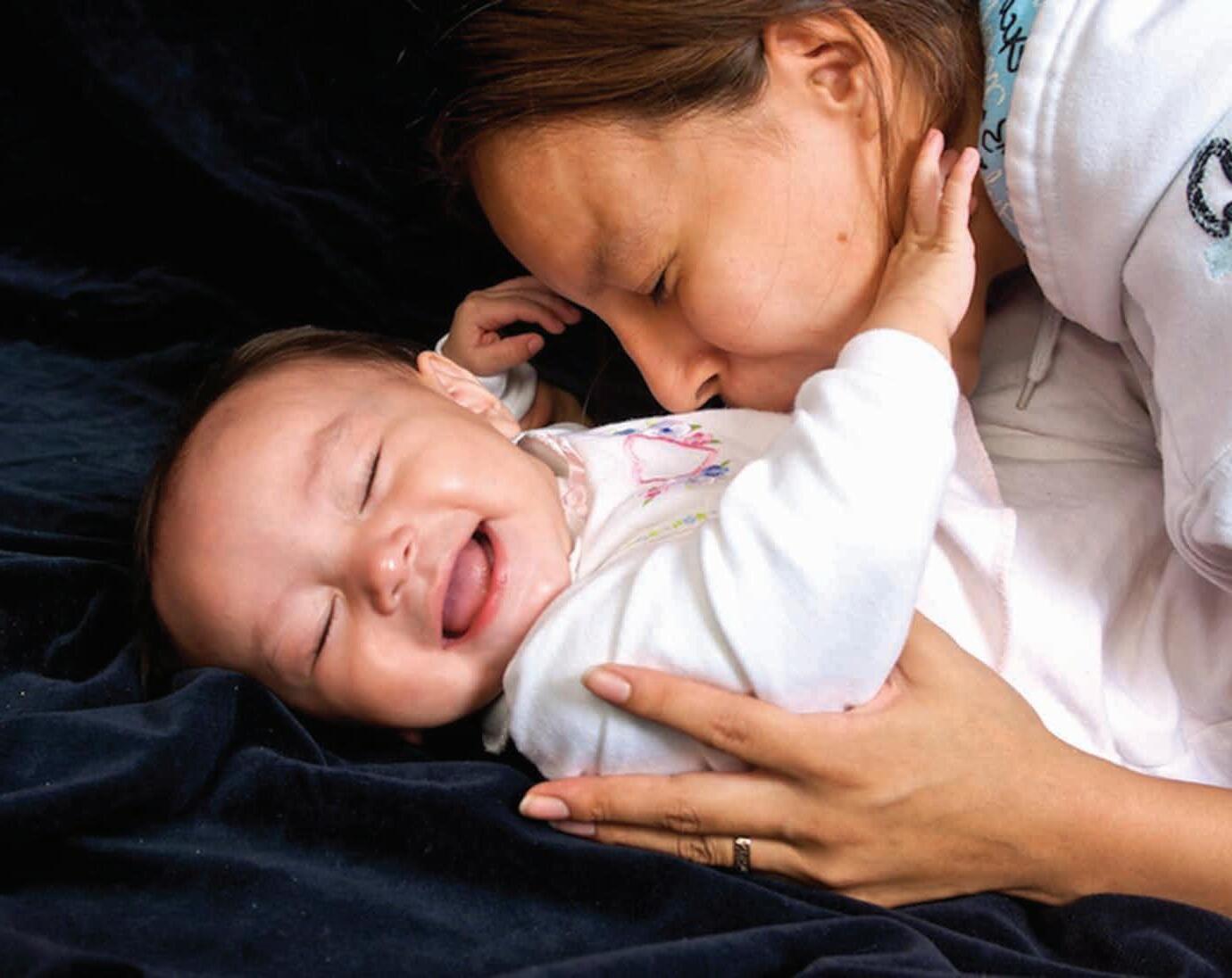
Play is important for your baby’s learning and healthy development. Some parents are not sure how to play with their baby. All babies have things they like and do not like. Learn from your baby about what he/she likes to play.
• See if your baby will copy you. Try sticking out your tongue, making a circle with your mouth or smacking your lips.
• Tell your baby a story using different sounds and voice, high and low, fast and slow. These sounds form the foundation for language.
• Pretend that you are your baby. What would you say about how you are feeling or what you need? When your baby begins to look hungry, say, “Oooh, I’m so hungry. My tummy hurts and I feel sad. I would tell you but I can’t talk, so I’ll just cry right now.” Then, you can respond, “OK beautiful, I will feed you, hold you and comfort you because I love you so much!”
• Describe the things and people around your baby. Talk to your baby about what you are doing with him/her and the reasons for doing it, such as changing his/her diaper. Talking to your baby is the foundation for how they are going to build their own language.
Babies’ circles widen as they grow and learn to roll over, sit up, crawl and stand. At 7 to 12 months of age, babies begin to be able to tell the difference between people they know and strangers. They may cry and hold on tight to their parents, or turn away from strangers. They learn about depth and distance as they drop and throw things. There are important things you can do to connect to your babies and support their learning and healthy development.
Grocery shopping is a great time to learn and connect with your baby.
• There are so many colours, shapes and words you can talk about with your baby.
• Do up the safety harness in shopping carts and baby strollers to keep your baby safe.
• Your baby may want to touch or hold everything, or they may be over stimulated by everything in the store. If you begin buying everything your baby wants, you will set up a pattern that may be hard to break.
• If your baby cries for something, distract him/her or wait in the car until the crying has stopped. Let your baby know you understand what he/she wanted and that he/she is disappointed. Explain the reason why your baby cannot have everything he/she wants. Talk about what your baby can have instead.
When your baby is frightened, worried or frustrated, respond to your baby in a calm and caring way. It is important for your baby to learn to trust that you will be there when he/she needs you.
Make sure safe, reliable, caring people take care of your baby when you are away from him/her. Safety becomes more important as your baby begins to move around. All babies need a safe place to explore and learn. There are things you can do to keep them safe.
• Remove poisons, household cleaners and other toxins from lower cabinets and put them up high so that they cannot be reached by your baby. If there is no other place to put these products, put safety locks on the cabinet doors. Keep bathroom and closet doors closed.
keesha kee tin means “I love you” in Michif
• Put child gates at the top and bottom of stairs.
• Think about things that your baby will soon be able to reach. Put away things that could break and hurt your baby.
• Make sure all hanging cords, ropes and strings are kept out of your baby’s reach.
• Find out about the different kinds of safety devices you might need in your home, such as devices to cover electrical outlets or to lock windows, doors, cabinets and toilets, and use them.
• Talk to your family support worker or program staff at your local community health centre, nursing station, parent child coalition, family centre in schools, and friendship centre about child proofing your home.
Is Your Child Safe? Play Time canada.ca/content/dam/hc-sc/migration/hc-sc/ cps-spc/alt_formats/pdf/pubs/cons/child-enfant/ child-enfant_play-jeu-eng.pdf
Your babies begin to make more sounds and connect sounds to people and things. Even before they can use words, they can tell you what they want through sounds, their facial expressions and body language. Some parents use sign language to communicate with their babies who cannot yet talk. If they do not know the official sign language, parents make up their own signs to communicate with them. Parents and their babies begin to understand each other.
• Can you tell what your baby wants and what your baby is feeling?
• What kind of signals is your baby giving you? Talk to your baby.
• Describe the things and people around your baby.
• Talk with your baby about what you are doing and what you are going to do together.
Structure and routines help your baby feel safe. Your baby will know what to expect and will not worry about what will come next. You help form your baby’s routine by doing the same things, at the same time each day. If your baby naps from 1:00 to 3:00 p.m. each day, then plan other activities for the morning. Try to set a routine around your baby’s needs.
• How much sleep does your baby need?
• When does your baby get hungry, tired or need to be changed?
Babies learn through play. It is the natural way they learn about their surroundings and how to express their thoughts and feelings, share their individual points of view and respond to others. Follow your baby’s lead. Watch your baby’s reaction during play. If your baby likes something, do it again. If your baby turns, try something else for playtime.
• Teach your baby traditional games and stories.
• Play peek a boo by covering your face or hiding a toy. This helps your baby understand that you are nearby, even if your baby can’t see you.
• Show your baby how to clap to the music or bang on a drum.
• Try to imitate your baby so your baby learns that communication goes both ways.
• Sing songs that teach about body parts.
• Sing songs and tell stories in your First Nations or Metis language.
• Give your baby attention and time, not material things he/she does not need.
Healthy Parenting Winnipeg parentinginmanitoba.ca

The toddler years (1 to 3 years) bring huge changes. During this time, toddlers learn to talk. They begin to discover their own power by saying “no” and seeing what happens when they do something. They want to explore and do things themselves. Toddlers are busy people. Parents can enjoy taking a fresh look at the world, through their toddler’s eyes.
Toddlers are great mimics. They will say and do exactly what you say and do. This can be quite eye opening for some parents. It is a good time for you to think carefully about the words you choose to use when you are around your toddlers. It also can be a great time for you to role model good choices and healthy living.
Parents often say to their toddlers what they heard from their own parents. The words and emotions just come out without thought. In order to change your words, you need to listen to what comes out of your mouth and when you say these things. Is this what you want to tell your toddlers? If not, stop right there and change it. It may feel weird or uncomfortable. That is okay and normal. Eventually, it will feel normal and good to speak only kind and loving words to your toddlers.
If you find that you are having a hard time being kind and loving toward your toddlers, get help from someone who can help you understand your parenting difficulties. All parents can benefit from support and information about parenting.
As parents, it is important to agree on what you expect from your children. If one parent says “yes” but the other parent says “no,” your children get confused. If you are a single parent, it is equally important for you to be consistent in your expectations of your children.
• Agree on what behaviours are and are not okay.
• Decide when, if ever, certain things are allowed, such as having a treat, watching TV or playing computer games.
• Talk about issues and limits with your children, before something happens. If you never had limits when you were a child, it may be hard to say “no” to your children.
• Plan for challenges before they happen, so you can be prepared for them and act calmly when dealing with your children.
“Get out of my way.”
“Why are you crying? Stop acting like a baby.”
“Shut up.”
“I told you not to do that. You are bad!”
“I’m a bother. They don’t want me. They would be better off without me.”
“I shouldn’t have feelings. Hide them. I am not safe.”
“Sit here, while I do this. You are such a good helper and a good listener.”
“I see that you are sad. Come sit with me and I’ll comfort you.”
“No one cares about me or what I say.” “Can you play quietly for a bit? I want to hear what you are saying, but I have to listen to someone else right now. Your turn is next.”
“I am bad, worthless. I can’t do anything right. I am a burden.”
“I’m afraid you might get hurt. Here’s what we can do to keep you safe...” Give them a choice: you can do this or you can do this.
Laugh as often as you can. Laughter and a sense of humour is good medicine.
Parents need to agree on when and how their children are disciplined. Discipline should not hurt your children physically, mentally, emotionally, spiritually or socially. Hurting your children makes them mistrust and become afraid of you. Teach your toddler and guide your toddler’s behaviour in a positive way, instead of punishing your toddler.
Children’s brains are growing and developing. Things that make perfect sense to you may not always make sense to your children. Be patient with them. Your toddler may get frustrated and angry, causing bursts of emotion or tantrums. It is okay for your toddler to be upset, but it is not okay for them to hurt others or themselves because they are upset. Sometimes it is as simple as your toddler needing a nap. Other times, it may be that too much is going on. Each outburst of emotions is an opportunity for you and your toddler to share a new way to handle stressful situations.
• Help your toddler to find ways to express his/her emotions, without being hurtful.
• What tools can you and your toddler use to calm down? Deep breathing, quiet time or taking a break?
• Create a safe space for your toddler to relax. Give him/ her a gentle head or back massage.
• Try to see things from your toddler’s point of view.
• Try to be aware of your own stress level. Sometimes children sense their parent’s stress long before their parents do. Learn how to cope with stress and minimize its impact on your children.
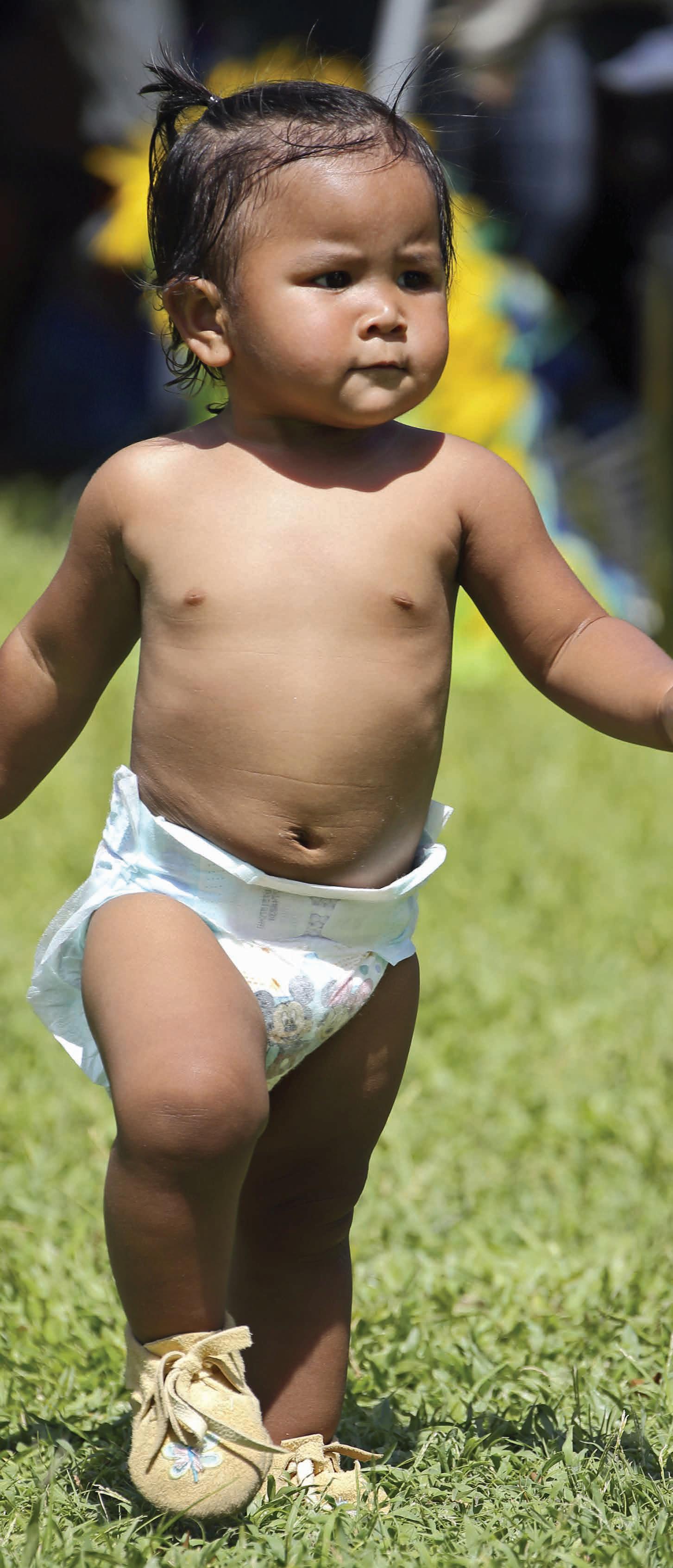
As children get older, they become more aware of their surroundings. They may be fearful about sleeping alone. Help your toddler feel safe by providing comfort to ease his/her fears.
• Name calling and yelling do not calm your toddler’s fears. These negative behaviours teach children to keep their fears to themselves and that they are alone in handling their fears.
• Talk with your toddler about their fears. Ask him/her, “What makes you feel safe?” Special toys can provide comfort for your toddler during these times.
• Explain common household noises or help your toddler to identify noises.
• Monitor any television shows or movies that your toddler watches. Toddlers often have difficulty separating reality and imagination. The content may make your toddler frightened, or your toddler may copy unwanted behaviours.
• When your toddler tells you that he/she is afraid, show you believe your toddler, listen and comfort him/her. You are your toddler’s secure base.
Tepwewakennimitisowin means “confidence” in Oji Cree
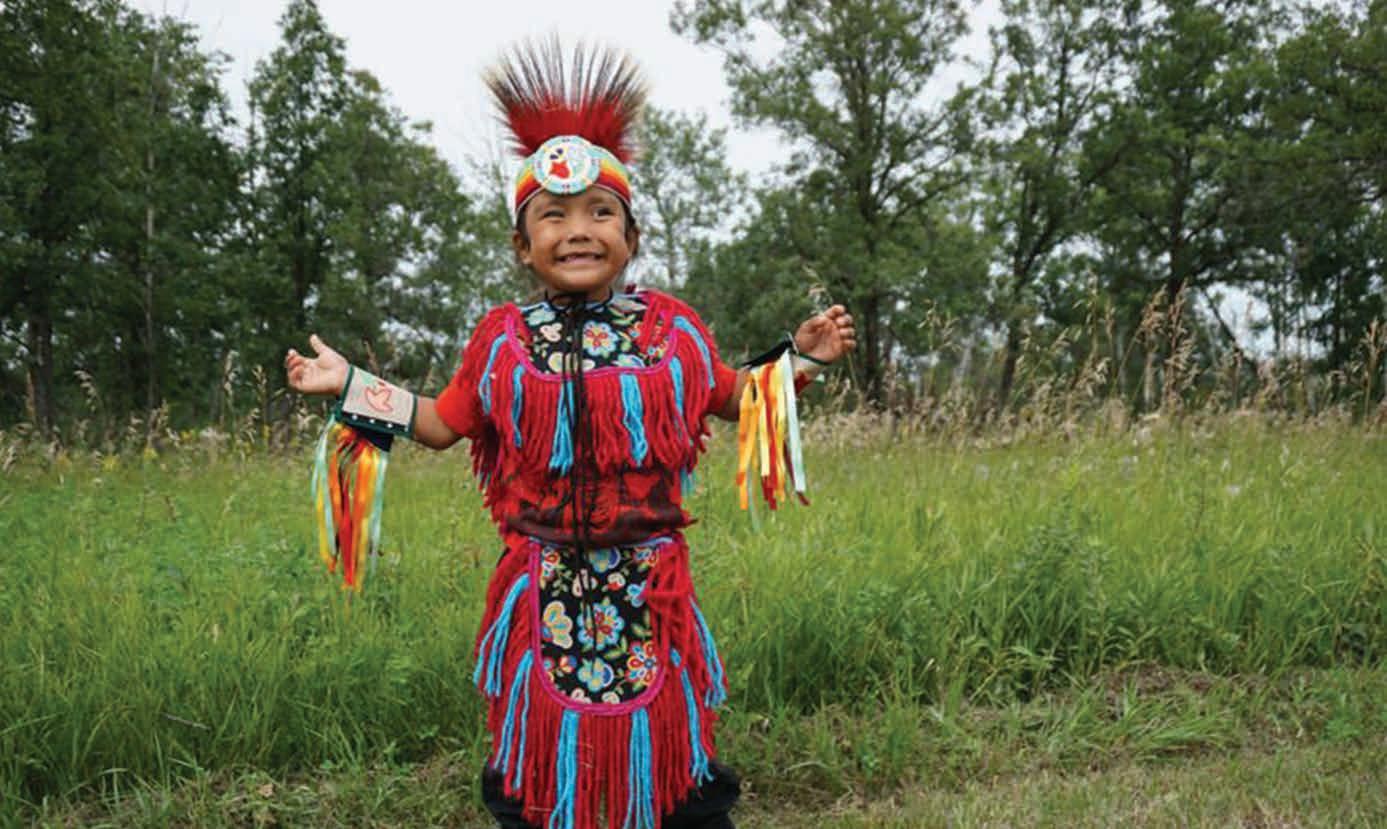
Early childhood is a wonderful stage in your toddler’s development for learning through play. There are a wide range of play based activities that you can do with your toddler, to teach him/her about patience, empathy and sharing.
• Hide and seek. Hide a toy or several toys, and then search for the toys together.
• Have a race. Create a starting place and have your toddler wait for your signal to start the race. The race ends with you at the finish line. You can give praise to your toddler for waiting. Restart the race if your toddler begins running too soon.
• Plant something together and watch it grow. It is fun to grow beans or herbs for the kitchen.
• Using puppets or toys, ask your toddler, “How would it feel if one puppet took another puppet’s toy? How would it feel if one puppet hit another puppet? What can they do to play together with kindness?”
• Make faces and have your toddler guess the emotion you are demonstrating. Ask your toddler what would make someone feel this way.
• When reading or looking at books together, ask questions about how the characters in the book are feeling and why they chose to do what they did.
• Toy exchange. Have your toddler pick out a few toys and hand them to you and others. After having the toy for a few minutes, let your toddler know it is time to trade toys. Each person can take turns choosing who gets what toy. Make sure that each person gets a chance to have each toy.
• Hot potato. Pretend a toy or ball is too hot to touch and must be passed on as soon as possible.
• Play games where you and your toddler have to take turns.
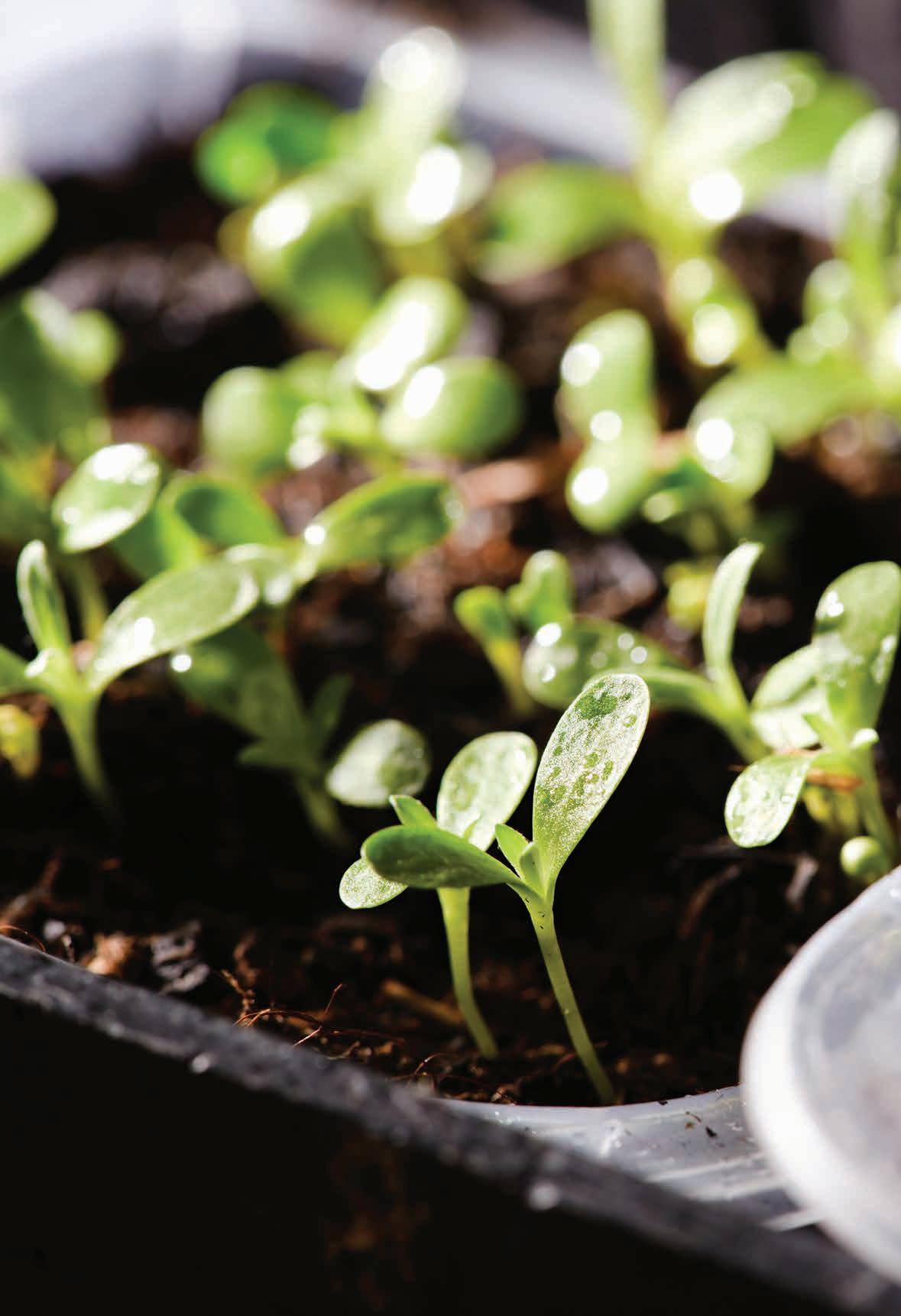
Give your baby attention and time, not things he/she does not need.
The preschool and kindergarten years (4 to 6 years of age) are a time of learning, growing and going places. Some parents find it hard to imagine their children going to school, outside of their care. Other parents had to let go of their children earlier due to work. Friends and teachers become a part of your children’s expanding world, with stories and experiences outside of your home.
Children want to please their parents. They need to know what they can and cannot do. They also need to learn and explore. Children learn about boundaries, and about what happens when they test other people’s limits. Often it is more useful to guide children’s energy into wanted behaviour than to discipline children for their unwanted behaviour. For example, energetic children can be taken to the park to play ball instead of feeling restless at home.
Help your children understand what their role is in the family. Teach them responsibility by letting them know exactly what you expect from them. This will help to avoid issues like yelling later on.
• Talk with your children about what happens if someone in the family does not do their job.
• Make sure jobs within the family fit with what your children are capable of doing, such as picking up clothes and putting them in a hamper, putting toys into a toy bin, sorting socks, or helping to set the table.
• Show your children how to do household chores.
• Be specific when you ask your children to do a task. For example, instead of telling your children to clean up, tell them to put the stuffed animals in the toy box.
• Remember, your children generally do the best they can because they want to please you.
“Teach a child one good thing, love, and the child will remember that the rest of their life.”
– Margaret Munroe, Island Lake Oji Cree Elder
The preschool and kindergarten years are a great time to help children develop their problem solving skills. They are learning about their own feelings and the emotions that affect their actions. They are also learning to identify feelings and emotions in others. Ask your children questions to help them understand feelings and emotions:
• How do you think that person is feeling?
• What do you think that person needs?
• What do you need when you feel that way?
• Who can help if you are feeling that way?
Play is important for preschool and kindergarten aged children. It enhances their healthy brain development by encouraging them to use and develop their social skills, coordination and gross motor skills, emotions and imagination. Connect with your children through play, both indoors and outside, every day.
• Let your children choose the game and take the lead.
• Shake the sillies out: sing and dance to get out excess energy and help your children focus.
• Animal matching game: decide on 3 animals. Stand back to back. Play 1 of the 3 animals. Say ready, set, go. Turn around and act out the animal. See how many times you and your child match.
• Make up a special handshake or greeting.
kissaywattisewin means “kindness” in Cree
There are several organizations that offer a range of culturally appropriate programs, resources and services to help parents and families throughout Manitoba achieve the best possible outcomes for their children. Some of these organizations are listed below.
211 Manitoba - Connects individuals and families to thousands of government and community-based programs and services available across the province to meet the needs of diverse populations, across all different aspects of life.
Phone: 211
Web: mb.211.ca
Aboriginal Health & Wellness Centre of WinnipegProvides culturally and community-based wrap-around health and social programs and supports for Indigenous women, men and families in Winnipeg.
Phone: 204-925-3700
Web: ahwc.ca
Adult Learning and Literacy - Administers and supports the development and delivery of adult focused programming through adult learning centres and adult literacy programs in Manitoba.
Phone: 204-945-8247
Toll Free: 1-800-282-8069
Web: edu.gov.mb.ca/all/index.html
Autism Spectrum Disorders Manitoba - Provides resources and information about various stages of Autism Spectrum Disorder (ASD) to support Manitoba families who have a child, teen, or adult with ASD.
Web: asdmb.ca
Canada Prenatal Nutrition Program - Provides support to improve the health and well being of pregnant women, new mothers, and babies facing challenging life circumstances.
Web: canada.ca/en/public-health/services/childinfant-health/supports-programs-pregnancy/prenatalnutrition-program-cpnp.html
Canadian Partnership for Children’s Health and Environment - Offers online resources to help protect children’s health from environmental contaminants.
Web: healthyenvironmentforkids.ca
Child and Family All Nations Coordinated Response Network - Provides information about programs and services to help families keep their children safe from abuse and neglect.
Phone: 204-944-4200
Web: ancr.ca
Children’s disABILITY Services - Offers a variety of resources to help parents with caring for children with developmental or physical disabilities at home, in their own communities.
Phone: 204-945-5898
Web: gov.mb.ca/fs/cds/index.html
Community Action Program for Children - Offers programs to support the healthy development of young children (birth-6 years) who are living in conditions of risk.
Web: canada.ca/en/public-health/services/child-infanthealth/community-action-program-children-capc.html
Dial-a-Dietitian - Connects callers to a registered dietitian who will listen and offer tips and suggestions about food, nutrition, and healthy eating to improve health and prevent disease.
Phone: 204-788-8248
Toll Free: 1-877-830-2892
Web: misericordia.mb.ca/programs/phcc/ dial-a-dietitian
Early Learning and Child Care Program - Supports quality, licensed, play based early learning and child care programs for children (12 weeks to 12 years) in Manitoba.
Phone: 204-945-0776
Toll Free: 1-888-213-4754
Web: gov.mb.ca/education/childcare
Find a Helpline - Offers links to several different helplines and hotlines where callers can connect with volunteers and counsellors in Manitoba to get help with a wide range of parenting and family related topics and crisis situations.
Web: findahelpline.com/countries/ca/mb
First Nations Health and Social Secretariat of Manitoba - Offers information and resources to promote awareness of health issues and referrals to programs and services to enhance the well-being of First Nations children and families in Manitoba.
Phone: 204-942-9400
Web: fnhssm.com
Health Links – Info Santé - Health Links is a bilingual phone-based program that connects individuals and families to registered nurses who provide assessment, triage, and health-care advice 24 hours a day, 7 days a week.
Phone: 204-788-8200
Toll Free: 1-888-315-9257
Web: misericordia.mb.ca/programs/phcc/ health-links-info-sante
Healthy Parenting Winnipeg - This division of the Winnipeg Regional Health Authority offers vast information and resources to support Manitoba families with healthy parenting at all ages and stages of early childhood development, from pregnancy to preschool.
Phone: 204-788-8200
Toll Free: 1-888-315-9257
Web: parentinginmanitoba.ca
Jordan’s Principle - Ensures that all First Nations children have access to the essential health, social, and educational services and supports they need, when they need it.
Toll Free: 1-833-725-8807
Web: sac-isc.gc.ca/eng/1568396042341/ 1568396159824#chp02
Manitoba Association of Friendship CentresProvides information about the programs and services offered at different friendship centres throughout Manitoba for pregnant women, children, and families.
Email: info@friendshipcentres.ca
Web: friendshipcentres.ca
Manitoba Communicable Disease ControlWorks to identify, manage, and prevent the spread of communicable diseases in Manitoba. Routine immunization schedules are available online.
Web: gov.mb.ca/health/publichealth/cdc/index.html
Manitoba Dental Association - Offers helpful information for patient dental care, including a directory of dental care providers in Manitoba.
Phone: 204-988-5300
Web: manitobadentist.ca/public-patients/ patient-resources
Manitoba FASD Network - The Manitoba FASD Network is a provincial FASD diagnostic and support organization with regional offices throughout Manitoba that offer specific programs and services for women with addictions and parents of children born with fetal alcohol spectrum disorder.
Web: fasdmanitoba.com
Manitoba First Nations Education Resource Centre
- Offers a variety of programs and resources to help with understanding and supporting the influence of early learning and development on the overall well-being of First Nations children.
Phone: 204-594-1290
Toll Free: 1-866-319-4857
Web: mfnerc.org/programs/early-learning
Manitoba Poison Centre - Provides information about poisons that can be found in the home and how to keep children and families safe from these possible dangers.
Toll Free: 1-855-776-4766
Web: manitobapoison.ca/for-families
Manitoba Prenatal Benefit - This monthly cheque helps pregnant women buy healthy foods during pregnancy. The benefit is available to all women, regardless of where they live in Manitoba.
Phone: 204-945-1301
Toll Free: 1-877-587-6224
Web: gov.mb.ca/healthychild/healthybaby/mpb.html
Manitoba Public Library Services - Offers an online directory of all public libraries in Manitoba.
Web: mb.countingopinions.com/memberlist _details.php
Metis Child, Family and Community Services - Works to strengthen the capacity of families to care for children through culturally appropriate, community-based programs and parenting supports.
Phone: 204-927-6960
Toll Free: 1-800-821-8793
Web: metiscfs.mb.ca/index.php
National Collaborating Centre for Indigenous Health (NCCIH) - The NCCIH is a source for a wide range of reliable, current, and culturally appropriate information on First Nations, Inuit, and Métis child, youth and family health.
Web: nccih.ca/34/Publication.nccih?pillar=1
Public Health Agency of Canada - Provides information about different programs and services to support health promotion and chronic disease prevention.
Toll Free: 1-844-280-5020
Web: canada.ca/en/public-health/programs.html
Red River Métis Community Resource - As the personal and family support division of the Manitoba Métis Federation, the Red River Métis Community Resource offers support services, resources, advocacy, and referrals to Métis individuals and families.
Phone: 204-586-8474
Web: mmf.mb.ca/rrm-community-resource
Rehabilitation Centre for Children - Brings together services from multiple specialized agencies that work in partnership with families to assess the needs of children and find solutions to increase function and promote quality of life.
Phone: 204-452-4311
Web: ccinc.ca/programs-and-services
Tse’ dhi ye means “gentleness” in Dené
Southern First Nations Network of Care - Provides a link to a wide range of programs and services to enhance the health, well-being, and quality of life for First Nations children and families in Manitoba.
Phone: 204-783-9190
Toll Free: 1-800-665-5762
Web: southernnetwork.org/site/resources
Specialized Services for Children & Youth - Provides coordinated, regionally based services to help children and youth with disabilities and additional needs to reach their full potential.
Phone: 204-452-4311
Web: sscy.ca
© Credit: (Front cover) Rachel Brown, private photo collection; (p. 4) AboriginalImages.ca, ID: 0918; (p. 5) Martha Troian, private photo collection; (p. 6) Martha Troian, private photo collection; (p. 7) iStockPhoto.com, ID: 89905543; (p. 8) Rachel Brown, private photo collection; (p. 10) Dreamstime.com, ID: 4004701; (p. 11) Dreamstime. com, ID: 19209452; (p. 12) Dreamstime.com, ID: 82351257; (p. 13) HCMO stock photos from September 23, 2008 photo shoot, ID: IAN0034; (p. 15) HCMO stock photos from September 23, 2008 photo shoot, ID: IAN0010; (p. 17) Dreamstime.com, ID: 60405002; (p. 18) Jason Parenteau, private photo collection; (p. 19) Dreamstime.com, ID: 69943332.
The booklets in this series include:
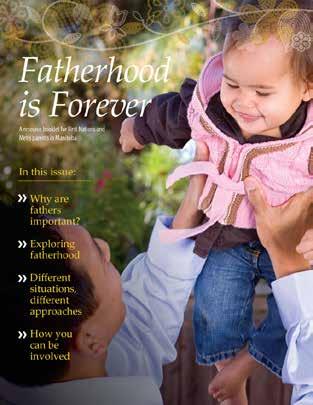

This booklet about fathering is for First Nations and Metis parents in Manitoba.
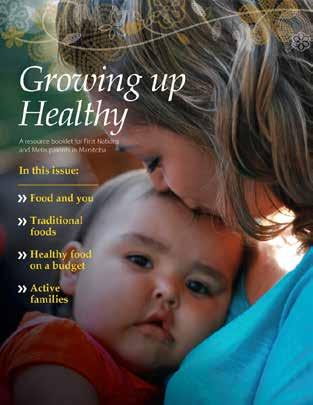
This booklet about bonding with your child is for First Nations and Metis parents in Manitoba.
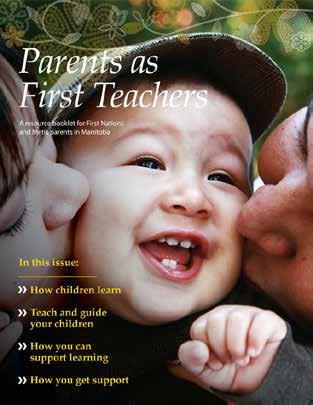
This booklet about healthy children is for First Nations and Metis parents in Manitoba.
This booklet about how children learn is for First Nations and Metis parents in Manitoba.
Available in alternate formats, on request. You can view all of the English booklets online at nccih.ca Aussi disponibles en français: ccnsa.ca
For more information:

3rd floor
332 Bannatyne Avenue
Winnipeg, MB R3A 0E2
204 945 2266
Toll Free: 1 888 848 0140 healthychild@gov.mb.ca
501 100 Park Royal South
West Vancouver, BC V7T 1A2 604 913 2080
info@fnha.ca fnha.ca

3333 University Way
Prince George, BC V2N 4Z9 250 960 5250
nccih@unbc.ca nccih.ca
nccih.ca/565/launchmanitoba-parentingbooklets.nccah